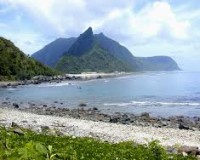 The Third International Conference on Small Island Developing States (SIDS) will be held in Apia, Samoa, in 2014 to focus the world’s attention on a group of countries that remain a special case for sustainable development in view of their unique and particular vulnerabilities.
The Third International Conference on Small Island Developing States (SIDS) will be held in Apia, Samoa, in 2014 to focus the world’s attention on a group of countries that remain a special case for sustainable development in view of their unique and particular vulnerabilities.
In Africa, national and regional preparatory meetings are underway in preparation for the 2014 conference and this regard, a preparatory meeting is scheduled to be held on 17-19 July, in the Seychelles as part of the Atlantic, Indian Island Ocean, and South China Sea (AIMS) region.
As part of the Economic Commission for Africa’s contribution to this process, the African Centre for Climate Change Policy (ACPC) is preparing a study that takes a comprehensive look at climate and development challenges, using some key human development and wealth profile indices, rather than a focus only on a trail of natural catastrophes that most SIDS are subjected to.
Rather than point exclusively to the perennial vulnerability differential that most SIDs have to contend with, the study under preparation speaks to the unique opportunities that can be harnessed in key sectors such as ecotourism, agriculture and fisheries. It also attempts to analyze strategies that will translate current vulnerabilities into concrete opportunities in ways that will lead to structural and institutional transformation.
According to ACPC, this study marks a significant departure from the current SIDs literature in analyzing the urgency for an “institutional renewal” – a process that will present policy and economic windows that will allow SIDs to graduate out of a Least Developed Countries (LDCs) status.
“It is one of the great paradoxes of the climate change narrative that the countries that suffer the most from natural disasters and extreme events are those that contributed the least to the problem; It is reported that out of the 25 countries that are subjected to the harsh vagaries of climate change impacts, 13 are from the small island developing states,” says ECA’s Executive Secretary, Mr, Carlos Lopes. He adds that the distribution of climate change impacts is not even and small island developing countries are exposed to multiple vulnerabilities beyond their immediate challenge of insularity, remoteness and a geographical location that is often conducive to natural disasters.
Small island developing states (SIDs) in Africa tend to have distinctive geographic, social, demographic and economic characteristics which affect their development strategies and prospects in significant ways. Vulnerabilities related to climate change can further result in loss of lives, and damage to property and infrastructure that can easily cripple their small economies.
ECA External Communications and Media Relations Section


